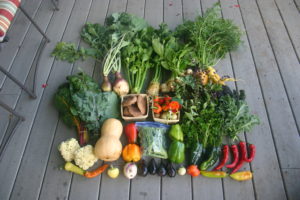Preserving the History of Organic/Sustainable Agriculture
Help preserve the history of organic/sustainable agriculture!
In the past few years, a confluence of concerns about climate change, the COVID-19 pandemic, and racial inequities have highlighted many flaws in the American food production and distribution systems, emphasizing the importance of creating more resilient, sustainable systems that can survive changes in an uncertain future. Local, organic, sustainable, ecological, regenerative, equitable—debates swirl around what these terms mean and what the ideal food system should look like. We stand at a potential watershed moment in American agricultural history, a time of crisis that might—or might not—be the catalyst to seriously reforming the food system.

Organic CSA share at Abbott Farms, Otsego, MI
Like previous generations living in such pivotal times, it is tempting to think that the challenges we face today are unique, unprecedented, novel. Pausing for contemplation is not a natural response to crisis; we want to plan, look ahead, shape a future that fulfills our hopes and avoids our fears. Yet, as we work toward a better tomorrow, we may be able to save valuable time, energy, and emotional fatigue by stopping briefly to look back at yesterday, to remember what others (and even some of us many years ago) have done when faced with similar crises in the past.
Throughout the history of American agriculture, systems that we would now call sustainable or organic have developed in parallel with the chemical-intensive industrialized paradigm that we call “conventional” agriculture today. Advocates for these systems faced agricultural crises as bad as or worse than those of 2020—the Dust Bowl, the oil crisis, mounting farm debts—and combined ideas both new and old to promote agricultural systems that they believed would be better both for society and the environment.
Important as these earlier efforts toward sustainable agriculture were, they have in general not been documented well by historians. Their story remains to be told, to be made available to the general public, to give perspective and background to the crises we face in agriculture today. And that’s where you can help!
I am focusing my graduate research at the University of Wisconsin-Madison on preserving the history of organic/sustainable agriculture. To make sure that I cover as diverse a range of perspectives as possible, I’m asking people who have been involved in organic/sustainable agriculture to fill out a brief, confidential questionnaire about the key people, publications, and organizations that helped shape your farming methods and philosophies. The information from this questionnaire will be used to identify and conduct oral history interviews with key figures in the organic/sustainable agriculture movement. I may be making a trip to the Northeast in mid-August, so if you are interested in being considered for an in-person oral history interview, please fill out the survey by July 15. I will be able to conduct remote interviews up through December.
My ultimate goal is to compile this information into a book to make the history of organic/sustainable agriculture available to the general public. It is my hope that a broader awareness of this history will help current and future sustainable agriculture advocates learn from both the successes and mistakes of their predecessors.
The story of sustainable agriculture must be preserved and told. Will you help with this important endeavor?

Anneliese Abbott QR code for survey
To fill out the questionnaire online, just follow this link or QR code. If you would prefer to fill out a paper survey, please send me a request via mail or email, and I will mail you one.

